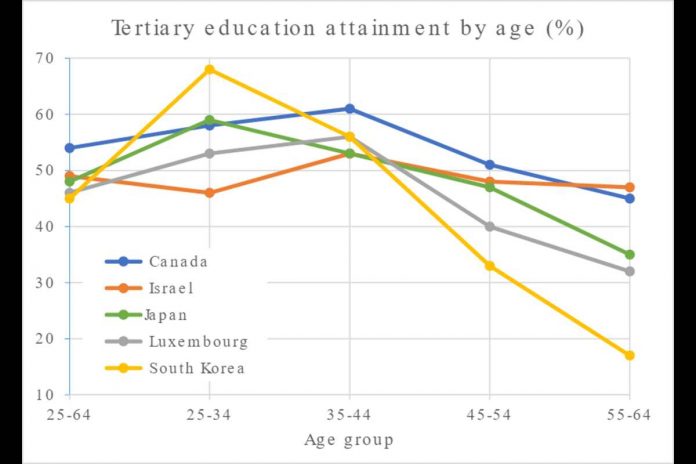Tertiary education is an education that is received after passing school. This is university-level education, which includes a diploma, graduation, under graduation, doctoral degree, etc. Tertiary education is also called third–level, third – stage or post-secondary education.
This education is commonly more descriptive and briefer and lasts up to around 3 – 4 years. Once you complete tertiary education, you will receive your graduation or master’s degree. It is considered the first step after you finish school academics. Some students prefer studying further to pursue a postgraduate degree which they achieve once they graduate. Various colleges and community schools provide tertiary education with certificates, diplomas, and associate’s and bachelor’s degrees: different colleges provide financial aid and even scholarships to excellent students.
Various online websites provide graduate, undergraduate, and other degrees. You can apply for this degree along with your job and work. The prime goal of tertiary education is to enhance the student’s knowledge in the desired field. Even government gives opportunities to the students to participate in the national research work of the country. This article will provide you with a brief description of tertiary education.
Importance of tertiary education
Every student wants to study higher and achieve their goals, and tertiary education provides this opportunity. Tertiary education helps to elevate the talent of students. Tertiary education not only benefits single students but also helps in empowering the country. Students pursuing tertiary education are considered more practical and expected to understand every situation. Tertiary education does not provide knowledge to certain limits but also upgrades a person’s overall being. It not only enhances a person’s work field but also enhances the person’s personality.
The knowledge provided in the tertiary market also helps make a person more practical and react to the market more sensibly. People who have pursued tertiary education are likely to be more efficient and effective than regular workers. There is a vast center of training provided to the students, which can help them to tackle problems more efficiently.
What are non – traditional students?
The non – traditional students have yet to attend school right after high school. Non – traditional students are not traditional students. They may have leaped their students after completing school. There are plenty of students in India who are considered non – traditional due to delays in admission to college. Sometimes students only study part-time in school due to various reasons. Then tertiary education allows these students to complete their academics timely. Colleges and universities are upgrading their rules to help the non – traditional students.
How schools offer tertiary education to the non – traditional students
Educating non – traditional students is quite different from teaching traditional students. These students have yet to gather their academics right after completing their school, which makes a big difference. Every student’s requirement is different from each other. Similarly, various colleges provide opportunities for conducting further studies. The life and experience of non – traditional students are quite different as they have not experienced real college life. So teachers try to maintain an atmosphere where they can study without problems. There are various ways to pursue tertiary education:
-
Online Education
Nowadays, online education is the solution to all the issues in the student’s life. A non – traditional student can only opt for other colleges close to them. Most the non – traditional students are either full-time workers or have part-time jobs. And it becomes impossible for them to leave their locality. While in this situation, online education is considered beneficial. Colleges and universities offer lectures and other training work that improve their skills and upgrade their knowledge in various fields. Online education can be the most convenient medium to pursue your education.
-
Accommodation for in-learners
In-learners refers to those courses which conduct in offline mode. Students can attend their classes physically. It is more beneficial than online classes as students can clear their queries. Even if in-learner types are helpful, it is challenging for the non – traditional student to attend classes regularly.
-
Text for speech for enhanced studying
Looking at the busy generation, it is only possible to have time for one thing. It would help if you were multitasking to achieve all your goals. At the same time, text-to-speech technology can help a non – traditional students cope with their studies. Even if you have attended the class, you still need to process all the essential topics that occurred in the course. You can listen to videos, audio, slide shows, etc.
Conclusion
Being an educated person is considered one of the honors of the country. While sometimes, due to various reasons, we cannot continue our studies. But there is no need to regret it. You can start studying along with your jobs, housework, etc. Tertiary education helps in providing growth and employment and reduces poverty. Colleges and universities offer tertiary education to support students.
FAQs
- What are the challenges faced by tertiary education institutions?
Nowadays, education is considered the most costly asset for students and families. While rising costs, political interference, student debt, and other things increase the challenges of tertiary education institutions.
- What is the importance of tertiary education?
Tertiary education can help in rapid employment growth, increased savings, and reduced poverty, automatically contributing to the country’s economy.
- What comes after tertiary education?
After completing tertiary education, you will prompt for your undergraduate, postgraduate, or doctoral degree.
- What qualifies as a tertiary qualification?
Once you study a course or program available in your universities, you will gain a tertiary qualification.
- Is tertiary education essential?
It is essential as it helps uplift the whole society and increase the social mobility needed to drive the country’s economic growth.

